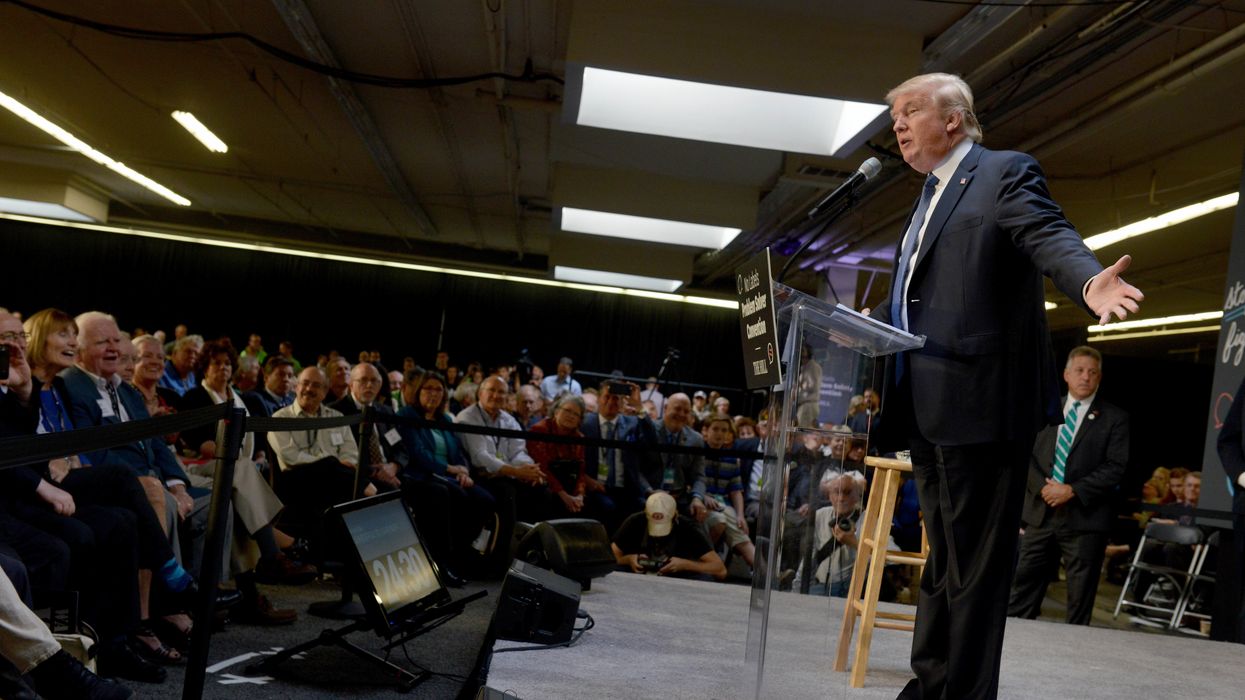No Labels, one of the most prominent nonprofits focused on bolstering bipartisanship in Washington as the prime cure for the ailing democracy, is wading in to the presidential race this weekend.
And it's hoping the effort goes better than last time, when the group helped propel candidate Donald Trump with its seal of approval as a "problem solver" and took it on the chin from most all the other forces in the world of democracy reform.
Nothing approaching that sort of endorsement is in the offing Sunday afternoon, when 1,200 voters are expected at a No Labels gathering in New Hampshire but only a handful of second-tier and iconoclastic presidential candidates are expected to make pitches for their support: Rep. Tulsi Gabbard of Hawaii, former Rep. John Delaney of Maryland and motivational author Marianne Williamson among the Democrats and former Gov. Bill Weld of Massachusetts the only Republican.
Organizers will conduct a straw poll of attendees at the end of the day, with the balloting not limited to those who have traveled to Manchester. The result could offer a small clue about which candidates are positioned to capture the nation's small but potentially dispositive clutch of centrist voters not loyal to either major party, the sort No Labelsattracts.
"No Labels believes the candidate who can best articulate their ability to be a 'problem solver' will ultimately capture the imagination of the public," the group said in announcing the gathering.
The president will not be there. When he attended the group's gathering in New Hampshire four years ago, he was roundly criticized by attendees for a combative 40-minute address focused on running down his GOP rivals, denigrating the Democrats and trumpeting the virtues of winning hard-knuckled negotiations rather than collaborating. While he promised to become "much less divisive" in the future, he then added: "Always remember this: I never start anything. I simply counterpunch."
Nonetheless, he was one of the five GOP presidential candidates to get labeled as a "problem solver" a few weeks before winning the state's first-in-the-nation 2016 primary, a victory that accelerated his march toward the Republican nomination.
Although by that time his candidacy was already known best for such combative and polarizing ideas as a border wall and a ban on Muslims entering the country, he and the others earned the No Labels blessing by signing a pledge promising to push bipartisan legislation that would assure the solvency of Medicare and Social Security through the end of the century, balance the federal budget by 2030, make the country "energy secure" by 2024 and create 25 million jobs over a decade.
Since winning the election, Trump has put his weight behind no efforts to address any of the first three challenges. So far in his presidency the economy has created about 6 million jobs, but many economists steer clear of crediting the president's signature 2017 tax cut.
The four-part pledge was widely ridiculed by most of the other similarly well-known and well-funded democracy reform groups. They contend No Labels wrongly puts too much emphasis on electing and promoting people in the ideological middle — wrongly believing that's the magic formula for sopping up the partisanship, divisiveness and incivility that have clogged the capital's policymaking wheels.
Instead, the other groups say systemic changes, mainly to reduce the influence of money in politics and boost competitiveness in legislative elections, are the best way to restore the policy-making system to good working order for the long haul.
Still, No Labels has claimed some significant wins since enduring all the criticism for its role in the rise of Trump.
The next year it created an organization of congressional allies, dubbed the Problem Solvers Caucus, which takes pains to keep its membership precisely equal among Democrats and Republicans. The group used its muscle to extract some changes in House rules this year designed to promote more bipartisan legislation. The most important is a procedure allowing bills sponsored by two-thirds of members (guaranteeing support from plenty in both parties) a floor vote even if the leadership doesn't like the legislation.
Last month No Labels released its set of "bold ideas to rebuild our democracy," including term limits for Supreme Court justices and a return of "earmarks," the line items dedicating spending for parochial projects that members were long allowed to insert in spending bills — on the assumption all the members who had won earmarks would vote for the underlying budgets and thereby ensure shutdowns would never happen.
This month the groups plans to publish "101 Nonpartisan Solutions to All the Issues that Matter," which seeks to educate the voters of 2020 in a non-polarizing way on the big issues of the day, from health care and gun control to climate change and transportation.




















Trump & Hegseth gave Mark Kelly a huge 2028 gift